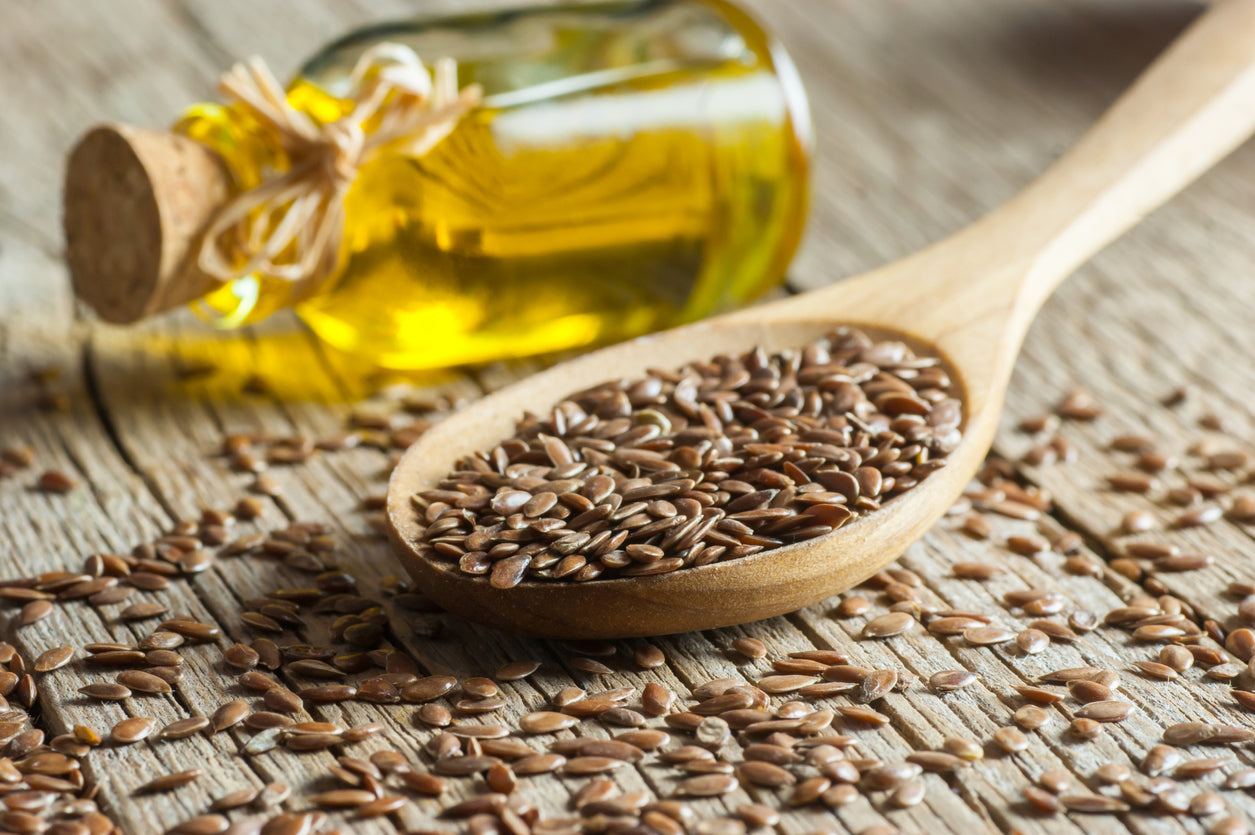Pamper your heart with this anti-inflammatory seed oil

Many have been conditioned to think of dietary fats as unhealthful, destructive, and just plain “bad.” Of course, nothing could be farther from the truth. Nutritionists tell us that fats - particularly those of the poly- and mono-unsaturated varieties - are not only beneficial but essential to nerve function, cognition, heart health, and survival in general.
However, the bewildering array of oils at our disposal can make it difficult to choose between them. How do palm oil, sunflower seed oil, olive oil, coconut oil, corn oil, soybean oil, and canola oil stack up against each other? Fortunately, when it comes to promoting a healthy heart, one specific oil emerges as an “MVP.” Let’s see what makes flaxseed oil so uniquely effective at supporting the health of your “ticker.”
Flaxseed oil is a rich source of heart-friendly ALA
Flaxseed oil, botanically known as Linum usitatissimum, contains an omega-3 fatty acid known as alpha-linolenic acid, or ALA. With proven antioxidant and anti-inflammatory effects, ALA is supremely well-suited to supporting cardiovascular health. And, at 60 percent ALA, flaxseed oil is one of the richest sources on the planet.
Incidentally, two other highly beneficial omega-3 fatty acids, DHA and EPA, occur in cold-water fatty fish, such as salmon and sardines. Flaxseed oil is an excellent alternative for vegans and vegetarians who wish to obtain their omega-3s from plant-based foods rather than animal sources. Other good sources of ALA include chia seeds and walnuts.
Research: Flaxseed oil lowers markers of inflammation in the body
Inflammation is a key factor for heart disease risks such as abdominal obesity, metabolic syndrome, and type 2 diabetes. Levels of inflammation are often indicated by the presence of inflammatory “markers” such as C-reactive protein - a pro-inflammatory chemical, which, when present in large amounts, is linked with heart disease. Flaxseed oil appears to have the ability to reduce these telltale inflammatory markers. In a review and meta-analysis of randomized controlled trials published in 2016 in Nutrients, the authors reported that flaxseed oil supplementation helped obese participants lower their C-reactive protein levels.
But that wasn’t all. In addition to reducing C-reactive protein, flaxseed oil also suppressed the inflammatory markers malondialdehyde and interleukin. Additional research has revealed that flaxseed oil can improve cholesterol profiles, leading the American Heart Association to advise its inclusion in the diet. For example, one small study showed that 12 weeks of supplementation with flaxseed oil significantly lowered levels of small-dense LDL cholesterol, which is implicated in atherosclerosis and heart disease. Simultaneously, flaxseed supplementation boosted levels of desirable HDL cholesterol. Finally, flaxseed oil is believed to help maintain the elasticity and flexibility of arteries, helping support healthy blood pressure.
Flaxseed oil restores moisture to skin and hair
If you suffer from a dry, scaly dermal texture (sometimes known as “alligator skin”) in the winter months, flaxseed oil could be your new best friend. In one small but compelling study published in Skin Pharmacology and Physiology, participants supplementing with flaxseed oil for 12 weeks experienced improvements in skin smoothness, hydration and scaliness. Flaxseed oil appears to accomplish this by improving barrier function, the all-important ability of the skin to prevent evaporative water loss and maintain its protective moisture. While not a magic bullet, supplementing with flaxseed oil may help you “tame the ‘gator.”
While consuming flaxseed oil carries obvious benefits for skin and hair, you may wonder if you can “eliminate the middleman” and apply the oil directly to your skin. Many natural beauty experts say there’s no reason why you shouldn’t. Not only can topical flaxseed oil help soothe and moisturize skin, but it can also help ease the itching and inflammation of atopic dermatitis or eczema. Flaxseed oil’s protective benefits extend to hair, as well. Its natural moisturizing properties allow it to “seal” the hair cuticle, helping to ward off frizz, dryness, damage, and breakage - while its high levels of antioxidant vitamin E allow it to protect against free radical damage. Simply massage the oil into the hair before washing, leave in for 15 minutes, then rinse and shampoo as usual.
Use flaxseed oil to enrich dips and spreads
Flaxseed oil, which has a mild, toasty flavor reminiscent of sesame or sunflower oil, can be used in dressings, smoothies, juices, and dipping sauces. Keep in mind, however, that flaxseed oil is not meant for cooking because it has a low smoke point.
Just one tablespoon (about 15 ml) of flaxseed oil can help you meet your ALA needs, which experts typically set at 1100 mg to 1600 mg daily. Look for cold-pressed, culinary-grade flaxseed oil verified by a reputable agency such as USP (U.S. Pharmacopeia), ConsumerLab, or NSF (National Sanitation Foundation), and keep it in a dark bottle in a cool, dry place. Naturally, check with your integrative physician before supplementing with flaxseed oil.
Remember: you can also enjoy nutty-tasting, golden-brown flax seeds stirred into yogurt, hummus, or oatmeal. A good source of soluble fiber, flax seeds provide prebiotic nourishment for the gut microbiome and support healthy digestion.
Other flaxseed “superpowers” may include:
- Relieving constipation
- Easing inflammatory bowel disease
- Lowering blood pressure
- Helping treat metabolic syndrome and alleviating nonalcoholic fatty liver disease
Beyond a doubt, this nutrient-packed, tasty flaxseed oil makes a great addition to your healthy diet.
Sources for this article include:






